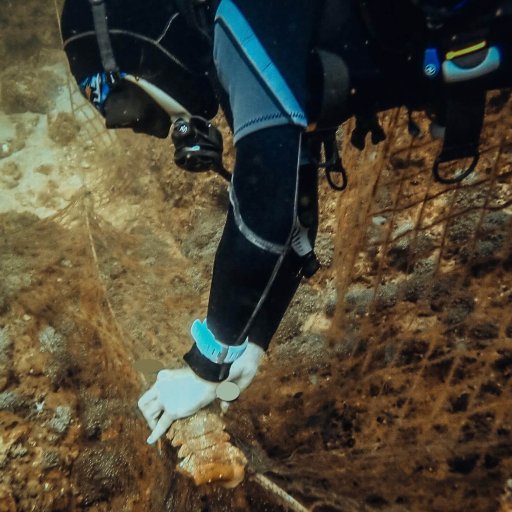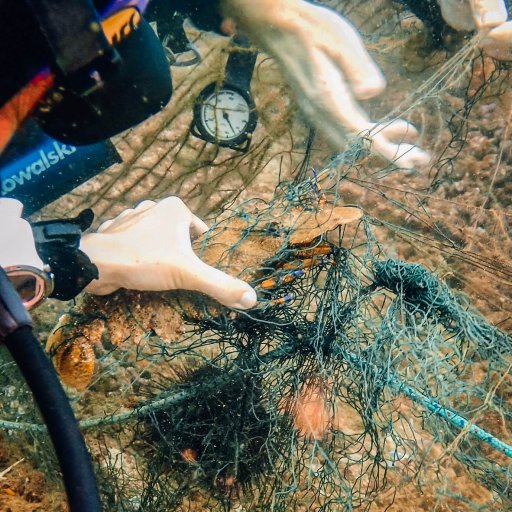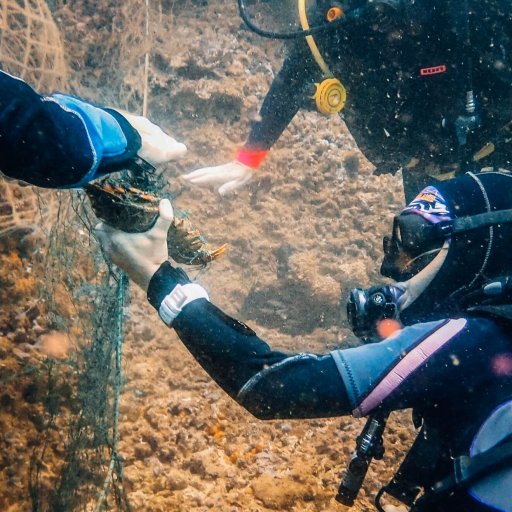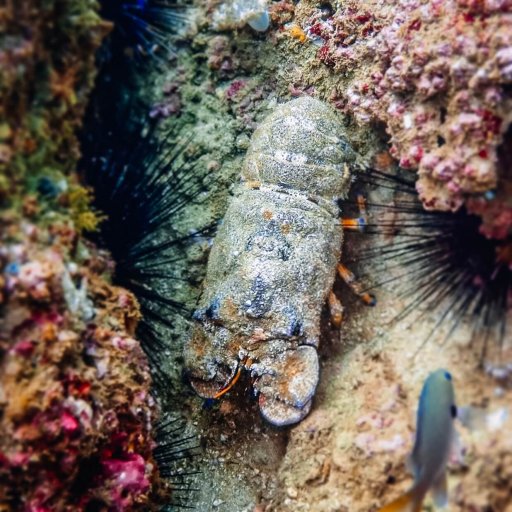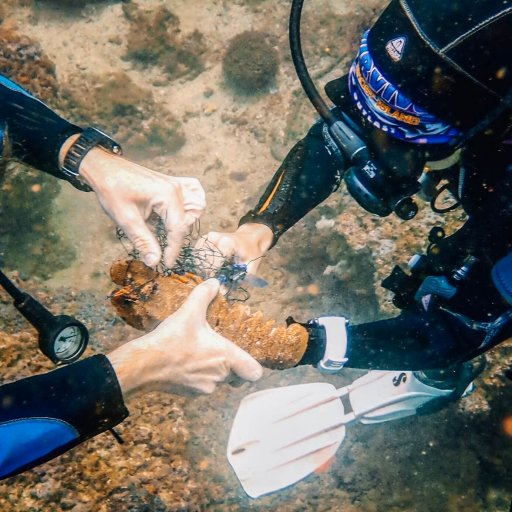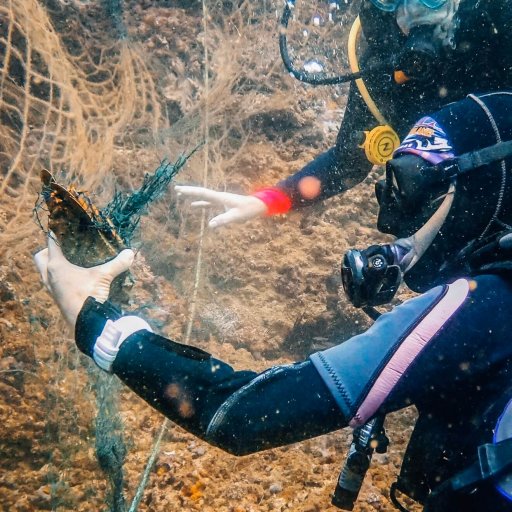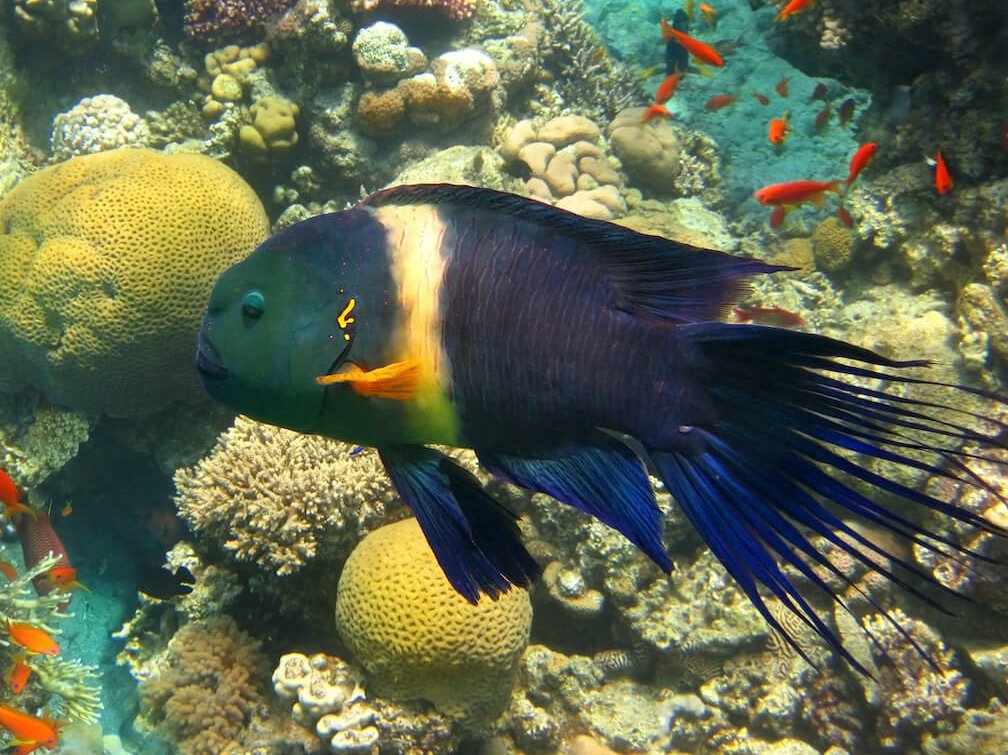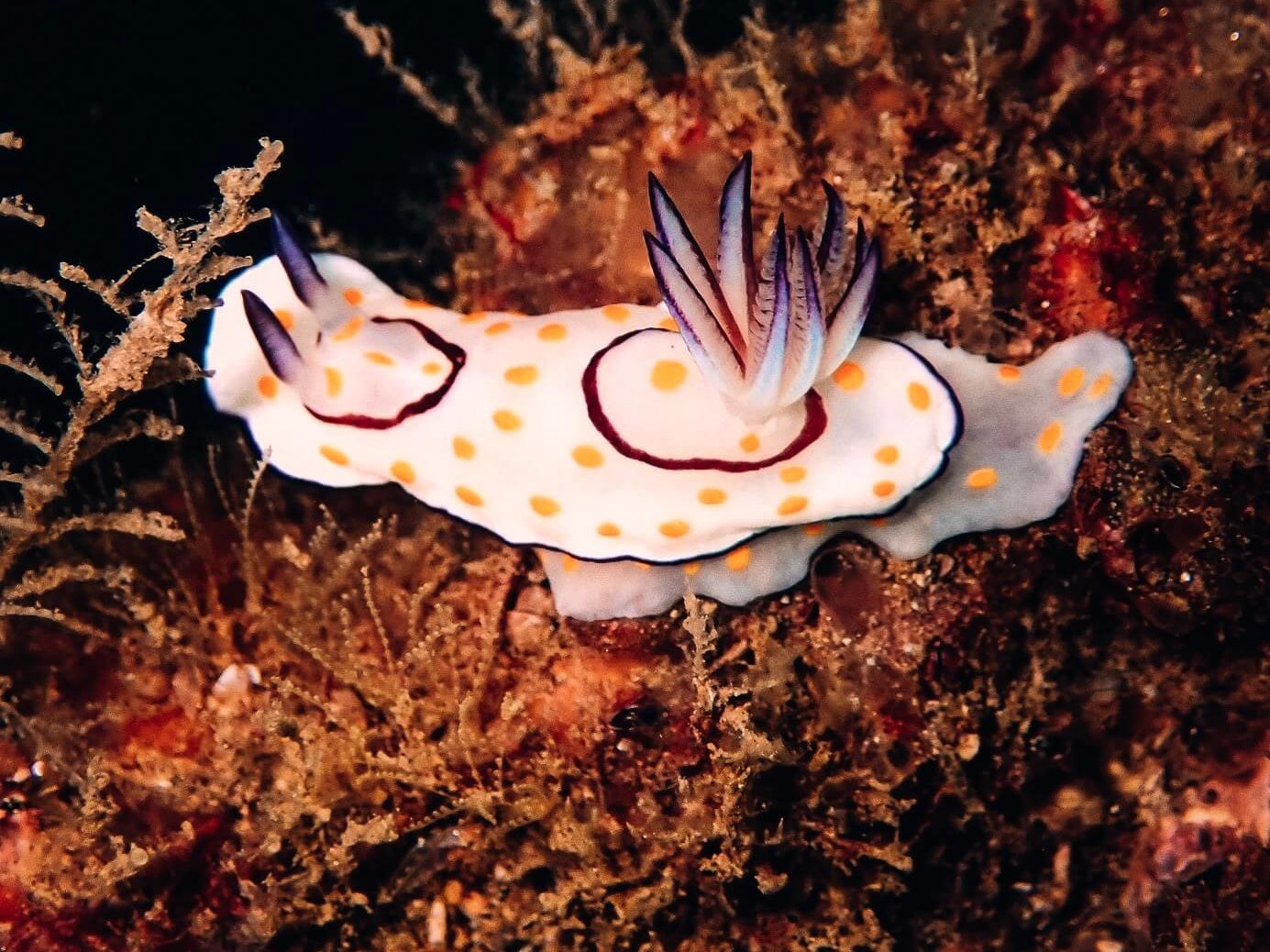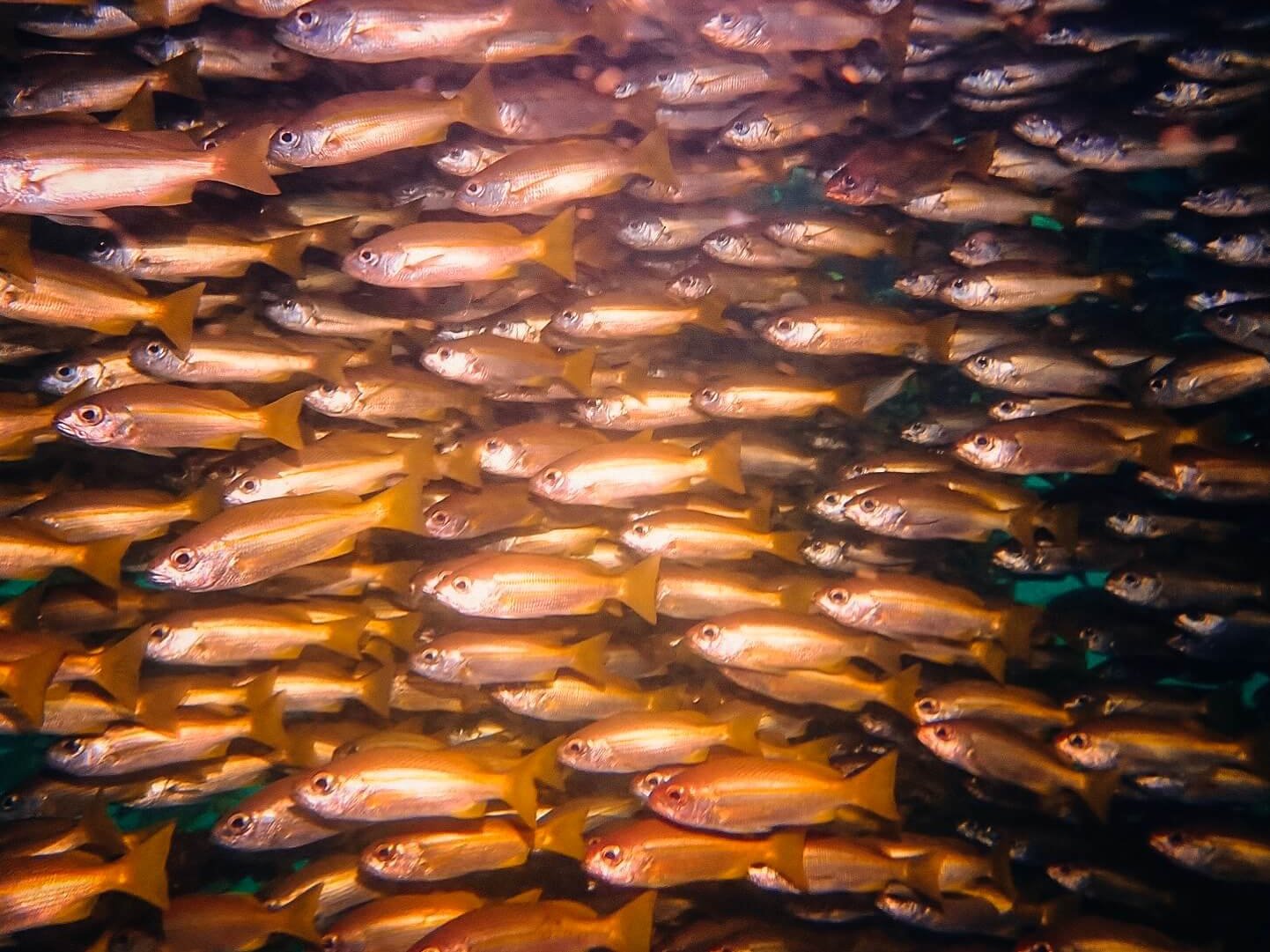Disclaimer: The unauthorized destruction of fishing nets is unlawful in Oman. I was not aware of this at the time. This post does not mention any sharp objects.
The air was hot and muggy as the sun scorched down on the dive boat. I was already bundled up in too many layers of neoprene, a good 8mm worth at my core at least, and covered from head to toe. I poked a finger under my hood at the side of my face, and stretched the thick layer of rubber away from my ear so that I could hear Stefan’s dive briefing. There were divers aboard who didn’t speak any English, and some who didn’t speak any German, so Stefan announced that he would be doing the briefing in both languages before hopping in the water to check the current, after which everyone could enter the water. Normally he might have asked for my assistance with some of this, but I was off duty today. Working or not though, I didn’t mind helping, and so offered to go check the current while he was briefing. A nod later and I clipped myself into my bcd and rolled backwards into the cool water.
I relaxed all my muscles and exhaled, then waited a moment for the water the permeate all the layers of rubber enveloping me, finally allowing me to descend. People always try to push themselves down with silly, flailing arm movements, usually not realizing that their feet are churning just as quickly as their arms are. All that movement is designed to push the body upwards. Then when they don’t sink a moment later, they usually get nervous and start to hold their breath just a bit, even though they know not to. It’s a natural reaction to unconsciously hold your breath when you’re trying to do something and it isn’t working. But trapping that air in the lungs just acts as another floatation aid to keep you at the surface. No, the trick is to hang limp like a ragdoll and slowly exhale all the air out of your body. Then you sink like a stone.
A moment later I was several meters down, staring at the rock wall. I added a little bit of air back to my bcd to make myself neutral, and held still once again. Now the trick was to watch the wall and see which way the water was pushing me. This would be a drift dive so we wanted to be diving the same direction down the wall as the current. There was barely any movement, but if we wanted to be moving with it, then we would need to start at the other end of the wall.
It took a few minutes to slowly ascend, move the boat, and then get the rest of the divers into the water. I was buddying up with a Dutch lady and her boyfriend. He was worried his ear might not allow him to descend, so I was accompanying them to be her buddy should he find himself unable to dive. That is exactly what happened, and he waved goodbye to us at 5 meters and we watched him reascend.
We were diving Ras Abu Daud, a small group of islands about 40 miles southeast down the coast from the capital city of Muscat. The main island itself was was nearly 2,000 feet long, and offered the last bit of reef sanctuary, away from the coast, for any large pelagics migrating up the gulf from the Arabian Sea. The sheer rock face had yet to show me anything bigger than the resident red snappers, but others had seen whale sharks and mola molas cruising by. I crossed my fingers that my last days of diving in Oman would be lucky ones.
With the sheer rock wall to our left, my buddy and I began finning, scanning the waters eagerly for something more exciting than the eels that popped out of nearly every crevice. We had only made it a few meters before we found ourselves finning against the current. I hesitated, looking to the Dutch lady I was diving with to see if she was struggling yet. How had I managed to choose the wrong direction when checking the current? The water had been nearly still at the other end of the long island, and now we were both kicking as hard as we could to stay in place. This was no way to dive. I signaled that we should turn around. There would be plenty to see at the point.
We passed Stefan and his divers struggling against the current and I gave an embarrassed wave. Luckily I was leaving soon, or that would have been the last time he took me up on my offer to check the current. Gotta love the ocean. No matter how experienced you think you are, she always has tricks up her sleeve to make you look like a complete noob.
I remembered there being a long stretch of abandoned fishing net up at 5 meters, running around the entire point of the island, and decided that we should go scan it to see if there were any fish in need of rescuing. I had mentioned the net to Stefan and Tanja before, but apparently the Omani government did not allow the removal of fishing nets unless they were proven to be abandoned, and getting the personel out to do so was nearly impossible.
The reef was much more alive and colorful up at 5 meters where the sun permeated more easily through the water. Luckily my buddy didn’t seem to mind a shallow dive. Some divers get weird about depth. They feel like they didn’t get a proper dive unless all the limits (depth, time, air) have been flirted with at some point or another. I’ve only ever cared about being where the best fish life is at, whether that’s at 5 meters or 30.
We did find several fish in the net, but we were beyond too late to come to their rescue. Nothing but scavenged meat and bones remained. I found the remnants of a large parrotfish, and poked at its beak with my dive ***** curiously. The edge of his beak was serrated and looked like a row of little, miniature teeth. I caught myself and moved on quickly before my new dive buddy started to wonder what kind of psycho she was diving with.
Farther down the net I spied a slipper lobster completely entangled. It wasn’t moving, but it also hadn’t been scavenged yet, which meant maybe it wasn’t dead.
As a diver you learn to never ever touch anything underwater, both for your own safety and for the well-being of the marine life. Even though the lobster was likely dead, I still hesitated a moment before wrapping my hand around its exoskeleton. When you spend your entire career preaching rules, it is difficult to break them, even under the right circumstances. That and touching no-longer-animate objects has always given me the heebie jeebies. I handed my camera to my buddy and procured my dive *****.
The moment my hand was around the lobster, it immediately struggled free again with a surprising amount of force for a creature tangled up and moving through something as dense as water with nothing for leverage. I grabbed a tighter hold of him this time, and could still barely hang on to the poor dude he was struggling so hard. Each time he struggled to be free, his poor little toothpick legs just became more wound-up and entangled. The surface of a lobster is very much like sandpaper, so the fishing net just clung to him like velcro.
I became very focused on the task of trying to untangle the poor creature, and was quite startled when I saw another pair of hands, much older than my buddy’s, with another ***** in front of my mask. One of the other buddy teams had come over to assist us. Over the course of several minutes, we eventually managed to untangle every last bit of green fishing net, and snap a couple photos before sending Sebastian on his way. Hopefully he would have enough sense to stay away from the net next time, but I really have no idea where a lobster’s intelligence ranks. I suspect not very high.
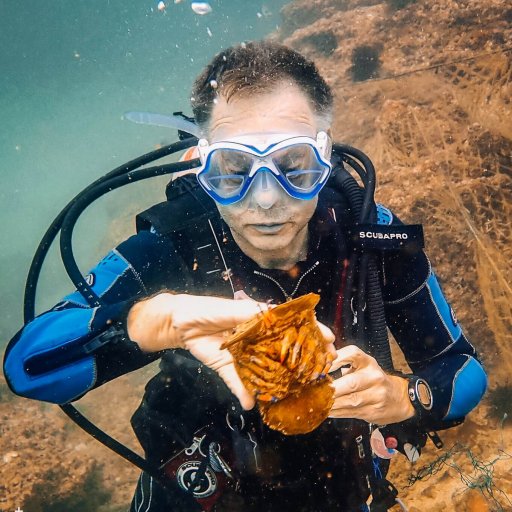
We had only just set him free when the lady from the other buddy team started pointing eagerly at a spot farther along in the net. We followed her outstretched finger and saw another slipper lobster, just as tangled up as the first one. Having a slightly better idea how to untangle them now, the two of us with ****** repeated the task. I left the older gentleman to finish the job when I discovered a third slipper lobster entangled not too far away, this one the biggest yet. I freed the portion of net he was tangled up in, at which point he managed to jerk free of my grip, projectile himself in a beautiful arc through the water, and disappear under the nearest rock. Great. He wouldn’t last very long with all that net still wound up around his legs, so without thinking about all the other spiny and toxic organisms that might be lurking under there, I stuck my hand under the rock to fish him back out. He did not come willingly, and I was once more impressed by what a death grip those spindly little legs could cling onto the nearest surface with. Eventually I did pry him free, and gripped his protesting, sandpapery midsection with as much strength as I had. When I had finally worked every last fiber of green net free, he scooted off as quickly as he had the first time, without so much as a thank you.
The whole scene, with us pairing up with lobsters and them swimming away once they could, gave me a sudden, whimsical memory of Alice in Wonderland.
'You may not have lived much under the sea—' (I haven't,' said Alice)—'and perhaps you were never even introduced to a lobster- -' (Alice began to say 'I once tasted—' but checked herself hastily, and said 'No, never') '—so you can have no idea what a delightful thing a Lobster Quadrille is!' 'No, indeed,' said Alice. 'What sort of a dance is it?' 'Why,' said the Gryphon, 'you first form into a line along the sea-shore—' 'Two lines!' cried the Mock Turtle. 'Seals, turtles, salmon, and so on; then, when you've cleared all the jelly-fish out of the way—' 'That generally takes some time,' interrupted the Gryphon. '—you advance twice—' 'Each with a lobster as a partner!' cried the Gryphon. 'Of course,' the Mock Turtle said: 'advance twice, set to partners—' '—change lobsters, and retire in same order,' continued the Gryphon. 'Then, you know,' the Mock Turtle went on, 'you throw the—' 'The lobsters!' shouted the Gryphon, with a bound into the air. '—as far out to sea as you can—' 'Swim after them!' screamed the Gryphon.
— Lewis Carroll, Alice’s Adventures in Wonderland
The task had taken us up to our maximum dive time of 60 minutes, so the four of us ascended together, smiling at our accomplishment and feeling as though a good deed had been done. Our boat captain did not share our sentiments, and spent the rest of the day shooting us dirty looks in jest when he heard that we had let a potential feast literally escape from our hands.
Our second dive brought us to a nearby wreck, which the shop’s intern had nicknamed the S.S. Nudibranch due to the abundance of different sea slugs that lived there. No other dive sites in the area offered such a high concentration of varied nudis, but that will have to wait til next time.
So what do you think? Would you set three lobsters free? Or bring them home for dinner? Be honest. I won’t tell anyone.
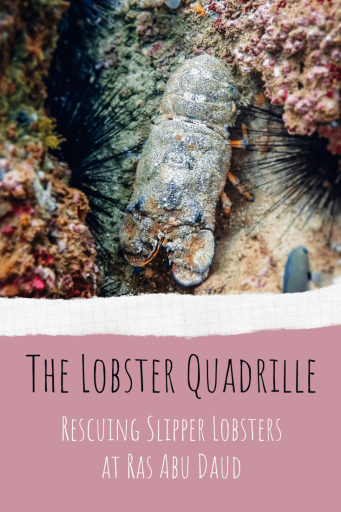
Dive Log
- Dive Site: Ras Abu Daud
- Max Depth: 22.1 meters
- Max Time: 60 min
- Water Temperature: 23-28 °C
- What I Wore: 3mm vest, 5mm long suit, 2mm short suit, & 7mm hood.
- Recommended Cert Level: Advanced Open Water


